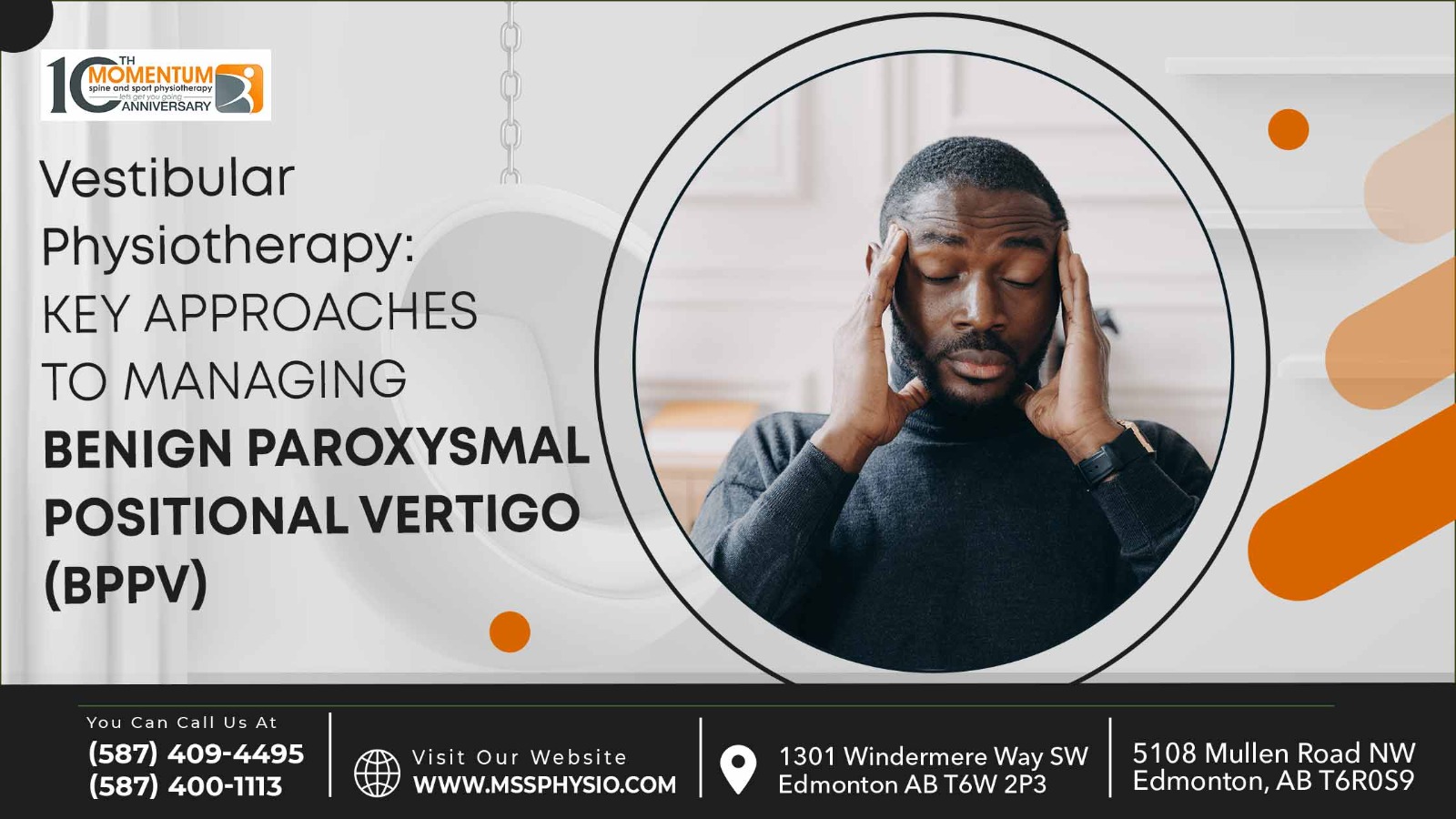The sensation that either you or your surroundings are spinning, even when everything is still, can be overwhelming. This sensation, termed vertigo, is a common manifestation of various vestibular disorders. One of the most frequent culprits behind this unsettling sensation is a condition known as Benign Paroxysmal Positional Vertigo (BPPV). Thankfully, vestibular physiotherapy, especially as practiced in reputed establishments such as Momentum Physiotherapy Edmonton, provides a beacon of hope for those afflicted.
Understanding BPPV: A Brief Overview
BPPV is a vestibular condition where tiny calcium particles become lodged in the inner ear. This causes short, intense episodes of dizziness that may be associated with changes in head position. Episodes of BPPV can be disconcerting, affecting an individual’s ability to perform everyday tasks.
Vestibular Physiotherapy: A Necessity for BPPV
The inner ear, a crucial component of the vestibular system, plays a significant role in how our body perceives balance and movement. When disrupted, as in the case of BPPV, specialized interventions such as Vertigo physiotherapy Edmonton become paramount.
Here are the primary approaches within vestibular physiotherapy that have shown effectiveness in managing BPPV:
- Epley Maneuver: A series of specific head movements to shift the tiny calcium particles to a part of the inner ear where they won’t cause vertigo.
- Brandt-Daroff Exercise: Used mainly when the Epley Maneuver is not feasible. It involves sequential movements to train the body to manage the disruptive signals sent by the inner ear to the brain.
- Foster Maneuver: A series of movements similar to the Epley Maneuver, but is a self-treatment approach, allowing individuals to manage their symptoms independently.
- Gaze Stabilization Exercises: These are designed to improve vision and the ability to focus on a stationary object while the head is moving.
- Functional Head Impulse Testing: A more advanced form of assessing the vestibulo-ocular reflex, this test helps in the detailed evaluation of how the eyes and inner ears coordinate, especially in response to sudden head movements.
- Vestibular Rehabilitation Using Virtual Reality (VR): This innovative approach uses VR technology to simulate environments and situations that can trigger vertigo symptoms, allowing patients to confront and manage their triggers in a controlled setting.
- Neurofeedback Training: Using real-time displays of brain activity, patients are taught to self-regulate physiological functions, which can, in turn, help in managing vertigo symptoms.
- Customized Home Exercise Programs: Based on the specific needs and triggers of a patient, customized HEPs are developed. These programs not only help in symptom management but also play a preventive role, reducing the frequency and intensity of future episodes.
The Psychological Impact of BPPV
Benign Paroxysmal Positional Vertigo (BPPV) is often perceived as a purely physical ailment, primarily involving episodes of dizziness and a loss of balance. However, its reach extends much deeper, influencing the psychological well-being of individuals who suffer from it. The unpredictability of vertigo episodes can generate feelings of apprehension, leading to a constant state of vigilance and an aversion to certain movements or activities that might trigger an episode.
This heightened sense of caution can morph into generalized anxiety over time. Patients may find themselves withdrawing from social activities or experiences they once enjoyed out of fear of an episode occurring. The sensation of spinning or dizziness can also evoke feelings of vulnerability, leading to reduced confidence in one’s physical capabilities.
Moreover, the intermittent nature of BPPV can be frustrating. The inconsistency of symptoms – feeling perfectly fine one moment and incapacitated the next – can lead to feelings of helplessness. Over time, this can have cascading effects, leading to depression or intensified anxiety.
In severe cases, individuals might develop phobias related to their triggers, further constraining their day-to-day lives. For instance, fear of heights (acrophobia) can intensify if an individual associates elevation with vertigo episodes.
The Proactive Role of Vestibular Rehabilitation
Vestibular Rehabilitation comes into play as a proactive strategy to address both the physical and psychological ramifications of BPPV. By employing specific exercises and interventions, vestibular rehabilitation aims to reduce the severity and frequency of vertigo episodes, alleviate symptoms, and improve overall quality of life.
- Desensitization: By repeatedly exposing patients to movements or positions that trigger vertigo in a controlled environment, they become less sensitive over time. This not only diminishes the physical response but also helps in breaking the cycle of fear associated with specific triggers.
- Balance Training: By enhancing balance and spatial orientation, patients regain confidence in their physical capabilities, reducing the anxiety associated with potential falls or mishaps.
- Counselling and Education: Knowledge is empowering. Understanding the mechanics of BPPV and the rationale behind each rehabilitation exercise can reduce the fear of the unknown. Counselling sessions also provide a platform for patients to express their concerns and fears, which can be addressed systematically.
- Mindfulness and Relaxation Techniques: Often incorporated into vestibular rehabilitation programs, these techniques help manage the anxiety and stress associated with BPPV.
Bringing Equilibrium: A Holistic View on BPPV Management
Navigating the disorienting waters of BPPV is undeniably challenging. Beyond the physical manifestations, its ripples are felt deep within one’s psyche, affecting the very essence of daily life. However, with advancements in vestibular physiotherapy Edmonton and specialized clinics like Momentum Physiotherapy, there’s renewed hope.
A holistic approach that integrates physical rehabilitation with psychological support ensures that individuals not only regain their balance but also reclaim their confidence and zest for life. As science delves deeper into understanding BPPV, the horizon appears promising, echoing a future where vertigo becomes a manageable, rather than a debilitating, condition.
